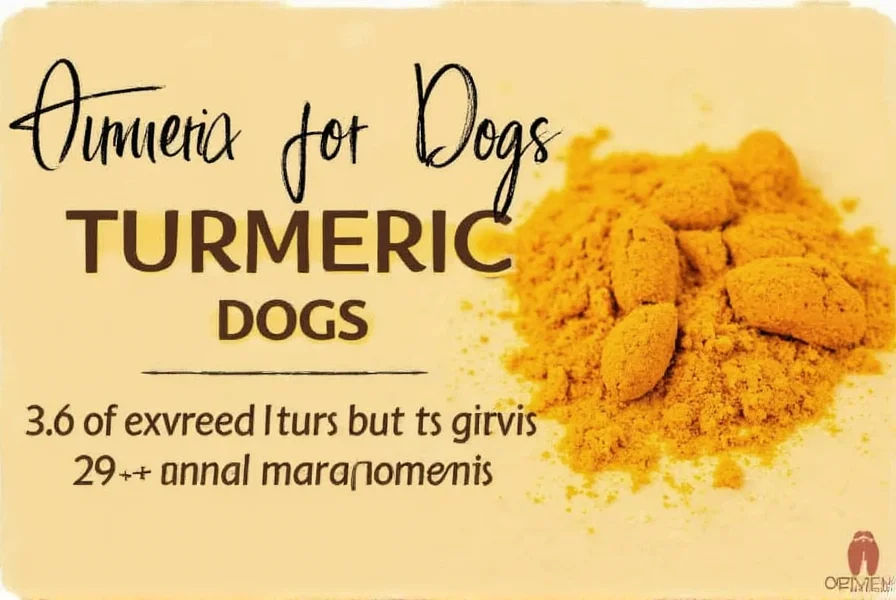Yes, turmeric is generally safe for dogs in appropriate amounts, but should be used with caution. The active compound curcumin offers potential anti-inflammatory benefits, particularly for joint health, but has low bioavailability. Always consult your veterinarian before adding turmeric to your dog's diet, especially if they have medical conditions or take medications. Proper dosage is critical—typically 1/8 to 1/4 teaspoon per 10 pounds of body weight daily, mixed with healthy fats and black pepper for absorption.
Many pet owners are exploring natural supplements to support their dogs' health, and turmeric has gained significant attention in the canine wellness community. This golden spice, used for centuries in traditional medicine, contains curcumin—a compound with powerful anti-inflammatory and antioxidant properties. While promising, understanding the appropriate use of turmeric for dogs requires careful consideration of scientific evidence, proper dosage, and potential risks.
The Science Behind Turmeric for Dogs
Curcumin, turmeric's primary active component, has been extensively studied for its health benefits in humans. Research specifically focused on dogs is more limited but growing. Studies suggest curcumin may help manage inflammation associated with osteoarthritis, one of the most common conditions in aging dogs. A 2016 study published in Veterinary Medicine and Science found that dogs with osteoarthritis showed improved mobility after receiving curcumin supplements.
However, curcumin has notoriously low bioavailability, meaning dogs (like humans) don't absorb it well on its own. This explains why simply adding turmeric powder to your dog's food may provide minimal benefits. The solution? Combining turmeric with black pepper (which contains piperine) and healthy fats significantly enhances absorption—a crucial consideration when exploring how to give turmeric to dogs effectively.
Potential Benefits of Turmeric for Canines
When properly administered, turmeric may offer several health benefits for dogs:
- Joint health support: Its anti-inflammatory properties may help manage arthritis symptoms
- Antioxidant protection: Helps combat oxidative stress and cellular damage
- Digestive support: May aid in maintaining healthy digestion
- Skin health: Potential benefits for certain skin conditions
- General wellness: May support overall immune function
It's important to note that while many dog owners report positive results with turmeric for dog arthritis, scientific evidence remains preliminary. Turmeric should never replace conventional veterinary treatments but may serve as a complementary approach under professional guidance.
Safety Considerations and Potential Side Effects
Understanding is turmeric safe for dogs requires awareness of potential risks:
| Condition | Concern | Recommendation |
|---|---|---|
| Digestive issues | High doses may cause stomach upset | Start with small amounts and monitor |
| Blood thinning | Natural blood-thinning properties | Avoid before surgery or with blood thinners |
| Gallbladder issues | May stimulate bile production | Contraindicated for dogs with gallstones |
| Diabetes | May affect blood sugar levels | Use only under veterinary supervision |
Common side effects of turmeric in dogs include mild digestive upset, especially when first introducing it. More serious concerns arise when turmeric interacts with certain medications or in dogs with specific health conditions. This underscores why determining is turmeric good for dogs with cancer or other serious conditions requires professional veterinary input—never self-prescribe for serious medical issues.
Proper Dosage and Administration Guidelines
Getting the turmeric dosage for dogs right is essential for both safety and effectiveness. Veterinarians typically recommend:
- 1/8 to 1/4 teaspoon of turmeric powder per 10 pounds of body weight daily
- Mixed with 1-2 teaspoons of healthy fat (coconut oil, olive oil, or fish oil)
- Plus a small pinch of black pepper to enhance absorption
- Divided between meals if giving larger amounts
Many pet owners create a "golden paste" by simmering turmeric powder with water, adding black pepper and healthy fats. This preparation improves bioavailability and makes dosing more consistent. When considering can dogs have turmeric and black pepper, the answer is yes—the combination is actually recommended for maximum benefit.

Choosing Quality Turmeric Products
Not all turmeric supplements are created equal. When selecting products for your dog, consider:
- Purity: Look for organic, non-GMO turmeric without fillers or additives
- Curcumin content: Higher concentrations may be more effective
- Formulation: Products designed specifically for pets often include absorption enhancers
- Third-party testing: Reputable brands provide certificates of analysis
- Veterinary approval: Some products are developed in consultation with veterinarians
Be wary of products making exaggerated claims about curing serious diseases. While turmeric supplements for dogs show promise for certain conditions, they are not miracle cures. Always check ingredient lists for potentially harmful additives that might be included in some commercial products.
When to Consult Your Veterinarian
Before introducing turmeric or any supplement to your dog's diet, consult your veterinarian, especially if:
- Your dog has pre-existing health conditions
- Your dog takes medications (particularly blood thinners or diabetes medications)
- You're considering turmeric for a serious condition like cancer
- Your dog is pregnant or nursing
- You notice any adverse reactions after starting turmeric
Your veterinarian can help determine if turmeric is appropriate for your dog's specific needs and help establish a safe, effective dosage. They may also recommend specific brands or formulations that have demonstrated quality and efficacy.
Conclusion
Turmeric shows promise as a natural supplement for supporting canine health, particularly for managing inflammation and joint issues. However, its effectiveness depends on proper formulation, dosage, and administration. While generally safe when used appropriately, turmeric isn't suitable for all dogs, and potential interactions with medications require careful consideration.
The most important step before adding turmeric to your dog's regimen is consulting with your veterinarian. With professional guidance, many dogs may benefit from this ancient spice as part of a comprehensive approach to wellness. Remember that supplements like turmeric work best when combined with proper nutrition, appropriate exercise, and regular veterinary care—not as standalone solutions to complex health issues.
Frequently Asked Questions
How much turmeric can I give my 50-pound dog?
For a 50-pound dog, the recommended turmeric dosage is typically 1/2 to 1 teaspoon of turmeric powder daily, mixed with healthy fats and a pinch of black pepper. Always start with the lower dose and gradually increase while monitoring for any digestive upset. Consult your veterinarian for personalized dosage recommendations based on your dog's specific health needs.
Can turmeric help with my dog's arthritis pain?
Turmeric may help manage arthritis symptoms in dogs due to its anti-inflammatory properties. Research suggests curcumin, the active compound in turmeric, can reduce inflammation associated with osteoarthritis. However, it's not a replacement for veterinary-prescribed pain management. Many veterinarians recommend turmeric as a complementary approach alongside conventional treatments, but effectiveness varies between dogs and requires proper formulation for absorption.
What are the signs that turmeric isn't agreeing with my dog?
Signs that turmeric may not agree with your dog include digestive upset (vomiting, diarrhea, or loss of appetite), excessive thirst, or changes in behavior. In rare cases, high doses can cause more serious issues like ulcers or interfere with blood clotting. If you notice any adverse reactions after starting turmeric, discontinue use immediately and consult your veterinarian. Always introduce new supplements gradually to monitor for potential negative reactions.
Can I use human turmeric supplements for my dog?
While human turmeric supplements aren't inherently dangerous for dogs, they're not optimized for canine physiology. Human supplements often contain higher concentrations that may not be appropriate for dogs, and may include ingredients safe for humans but potentially problematic for dogs. Veterinary-formulated turmeric products for dogs typically include the proper curcumin concentration, absorption enhancers, and are dosed specifically for canine use. Always consult your veterinarian before giving human supplements to your dog.











 浙公网安备
33010002000092号
浙公网安备
33010002000092号 浙B2-20120091-4
浙B2-20120091-4